Revolutionizing Supply Chain Management: The Power of AI and Predictive Logistics
In today’s fast-paced business landscape, supply chain management has become a critical factor in determining the success of companies across various industries. As global markets continue to evolve and consumer demands shift rapidly, businesses are turning to cutting-edge technologies to stay ahead of the curve. One such technology that is transforming the supply chain landscape is Artificial Intelligence (AI). With its ability to analyze vast amounts of data, predict future trends, and automate complex processes, AI is empowering businesses to build smarter, more agile supply chains.
Predictive Analytics: Forecasting Demand and Mitigating Risks
One of the most significant applications of AI in supply chain management is **predictive analytics**. By leveraging machine learning algorithms and statistical models, AI-powered systems can analyze historical data, identify patterns, and forecast future demand with remarkable accuracy. This enables businesses to proactively manage their inventory levels, reducing the risk of stockouts and minimizing excess inventory costs.
Predictive analytics also plays a crucial role in identifying potential disruptions in the supply chain. By monitoring real-time data from various sources, such as weather reports, social media, and news outlets, AI algorithms can detect early warning signs of supply chain disruptions. This allows businesses to take proactive measures to mitigate risks and ensure the smooth flow of goods and services.
Demand Forecasting: Staying Ahead of the Curve
Accurate demand forecasting is essential for effective supply chain management. AI technology excels in this domain by analyzing diverse data sources, including sales records, customer transactions, and economic indicators. By leveraging advanced machine learning techniques, AI algorithms can identify complex patterns and correlations that may not be apparent to human analysts.
For instance, AI can analyze historical sales data, seasonal trends, and customer behavior to predict future demand for specific products. This enables businesses to optimize their production schedules, inventory levels, and distribution strategies, ensuring that the right products are available at the right time and place. By staying ahead of the demand curve, companies can improve customer satisfaction, reduce waste, and maximize their profitability.
Warehouse Automation: Enhancing Efficiency and Productivity
AI is also revolutionizing warehouse operations through the deployment of **autonomous mobile robots (AMRs)**. These intelligent robots are designed to navigate warehouses autonomously, performing tasks such as picking, packing, and replenishing inventory. By automating repetitive and labor-intensive tasks, AMRs can significantly improve warehouse efficiency and productivity.
Moreover, AI algorithms can optimize the movement of AMRs within the warehouse, ensuring that they take the most efficient routes and avoid congestion. This not only reduces the time and cost associated with warehouse operations but also frees up human workers to focus on more complex and value-added tasks.
Supply Chain Optimization: Streamlining Workflows and Enhancing Transparency
AI technology is transforming the entire supply chain, from sourcing raw materials to delivering finished products to customers. By analyzing vast amounts of data from various touchpoints along the supply chain, AI algorithms can identify bottlenecks, optimize routes, and streamline workflows.
For example, AI can analyze transportation data to determine the most efficient shipping routes, taking into account factors such as weather conditions, traffic patterns, and fuel costs. This not only reduces transportation costs but also improves delivery times and enhances customer satisfaction.
Furthermore, AI enhances supply chain transparency by providing real-time visibility into the movement of goods and the status of orders. This allows stakeholders, including suppliers, manufacturers, and customers, to track the progress of their orders and make informed decisions based on up-to-date information.
The Future of Supply Chain Management: Embracing AI and Predictive Logistics
As AI continues to advance, its impact on supply chain management will only grow stronger. Businesses that embrace AI and predictive logistics will be well-positioned to navigate the complexities of modern supply chains, respond quickly to changing market conditions, and deliver exceptional value to their customers.
However, the adoption of AI in supply chain management is not without challenges. Companies must invest in the right infrastructure, talent, and processes to fully leverage the potential of AI. They must also address concerns around data privacy, security, and ethical considerations.
Despite these challenges, the benefits of AI in supply chain management far outweigh the risks. By harnessing the power of predictive analytics, demand forecasting, warehouse automation, and supply chain optimization, businesses can build smarter, more agile supply chains that drive growth, innovation, and customer satisfaction.
#PredictiveLogistics #AISupplyChain #SmartSupplyChain
-> Original article and inspiration provided by LeadsProMax.ai posted by AJOT
-> Connect with one of our LeadsProMax.ai Strategists today at LeadsProMax.ai


